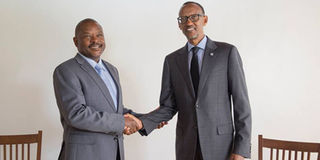Resolve Rwanda,Burundi row,EAC presidents urged

What you need to know:
- Despite the simmering row between Burundi and Rwanda for years, regional leaders have not shown serious efforts to mediate or act on the deteriorating relations
Arusha. Regional leaders have come under fire for what is seen as their failure to resolve the escalating dispute between Burundi and Rwanda, which is threatening to destabilise the East African Community (EAC).
Should the situation persist, there is a danger of mistrust among partner states becoming more pronounced and even lead to the collapse of the EAC, some observers have warned.
“We should not allow a situation that could bring back memories of 1977 when the community collapsed,” warned Mr Mohamed Habib Mnyaa, a Tanzanian member of the East African Legislative Assembly (Eala).
He said the existing mistrust between Burundi and Rwanda was just one of the multiple crises the EAC is currently going through.
“Leaders of member states should intervene so that problems between the two countries are tackled and a permanent solution found,” he told The Citizen.
Mr Mnyaa said reluctance of officials of the two countries to visit their neighbour even during activities organised by the EAC was worrisome.
There has in recent weeks been a war of words between Burundi and Uganda over the deteriorating relations between the former and Rwanda.
President Pierre Nkurunziza of Burundi has again accused Rwanda of destabilising his country through elements wanted for the 2015 coup attempt.
Rwandan President Paul Kagame, while on a visit abroad last weekend, distanced his country from the allegations, and attributed problems at the EAC secretariat to “poor leadership”.
The EAC secretariat is currently headed by Mr Liberat Mfumukeko, a Burundi national, who has been the regional bloc’s secretary-general since April 2016.
Mr Mfumukeko could not be reached to respond to concerns raised by President Kagame. However, other senior officials downplayed fears of the EAC’s collapse.
“The mistrust between Burundi and Rwanda and resource constraints are not new at the EAC,” said Mr Steven Mlote, the deputy secretary-general (Planning and Infrastructure).
He declined to discuss allegations of mismanagement levelled at the secretariat by Mr Kagame.
Mr Mlote, who is also the acting deputy secretary-general (Finance and Administration) said the cancellation of the heads of state summit twice in recent weeks did not mean that the EAC was on the verge of collapse.
A request by Ugandan Eala member George Odongo that the assembly discuss deteriorating relations between Burundi and Rwanda was rejected by the speaker, Mr Martin Ngoga, on Tuesday.
He said mistrust between Burundi and Rwanda does not give hope of peaceful coexistence in the region as per the EAC Treaty.
But Mr Ngoga said such issues could only be discussed at the heads of state summit.
“Leave it to the summit. That could be hearsay which could be true or not true,” he said in response to reports that some Uganda students were recently denied entry into Burundi.
A senior Eala official also warned that the simmering row between Burundi and Rwanda row should not be taken lightly because it could bring the regional integration process to a shuddering halt.
He cited as an example the refusal by Burundi to recognise Mr Ngoga, a Rwandan national, as Eala speaker. Burundi has filed a case challenging Mr Ngoga’s election last year.
Mr Ngoga was elected last December in a vote that was boycotted by Burundian members and some legislators from Tanzania.
Burundi had also fielded a candidate, insisting that it was its turn to take over the position, not Rwanda’s.
Bujumbura later filed a case at the East African Court of Justice (EACJ) challenging Mr Ngoga’s election. The matter has yet to be determined.




